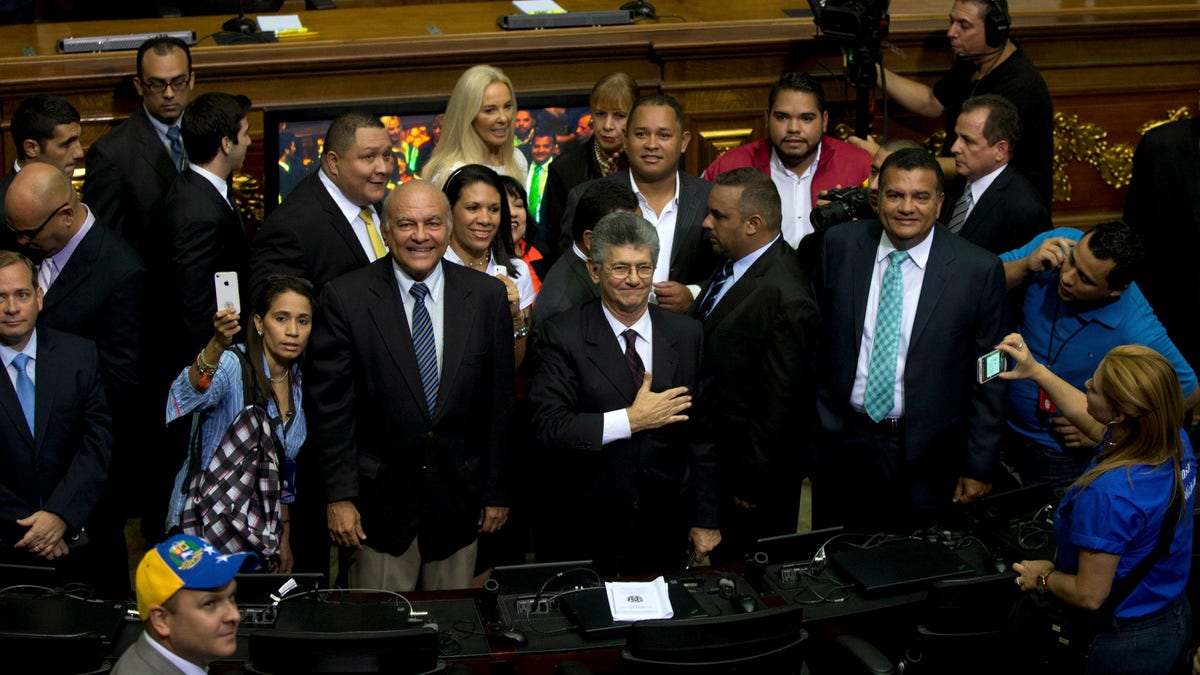
Henry Ramos Allup upon his arrival to the National Assembly in Caracas, Tuesday, Jan. 5, 2016. (ap)
Caracas – All eyes were on Henry Ramos Allup Tuesday in Venezuela, as he swore in to become the first non-Chavista to head the National Assembly – or any other national institution – in the 17 years since the late Hugo Chavez begun his socialist revolution.
Ramos Allup, whose radical views are not welcome by all in the wide-ranging opposition coalition, faces the task to lead the 112 lawmakers that make up an unprecedented two-thirds majority — even when three of those seats are currently being contested by the Supreme Court.
Earlier in the day, hundreds of opposition supporters accompanied the incoming lawmakers in a march past a heavy military barricade to the legislature downtown. A few blocks away, a far larger crowd of government supporters gathered outside the presidential palace to lament the inauguration of what they called the "bourgeois parliament."
Reflecting the changing political winds, journalists for the first time in years were granted access to the legislature and state TV broadcast interviews with the opposition political leaders.
Conspicuously absent inside the dome-roofed legislative building were the oversized portraits of Chavez and independence hero Simon Bolivar that had been a fixture for years.
Instead, from the public gallery, the wife of jailed opposition leader Leopoldo Lopez held up a sign reading "Amnesty Now," referring to what could be one of the legislature's first orders of business: a law freeing dozens of activists jailed during anti-government unrest in 2014.
In an interview Monday, not long after he was blocked access to the Assembly’s building by pro-government bullies, Ramos told Fox News Latino the challenge ahead is not small and yet he is planning to face it head-on.
He said the so-called supermajority was elected by the people and he will fight for each one of those seats.
“Of course [we will proceed to swear in the three congressmen-elect being contested.] The Armed Forces have to provide us with security and they have told us that they will do so,” he said.
Ramos, who is 72, said the hostilities shown Monday didn’t prevent the new lawmakers from taking possession of their new offices and regretted the confrontational attitude coming from the now weakened Chavismo.
“They don’t realize that is that kind of attitude what cost them the Dec. 6 elections,” he told FNL “They haven’t learned that day’s lesson, and I doubt they ever will.”
Before the legislature convened on Tuesday morning, hundreds of opposition supporters escorted the incoming lawmakers past a heavily-guarded military barricade toward the dome-roofed, neoclassical legislature building downtown.
A few blocks away, outside the Miraflores presidential palace, men on motorcycles roared through a group of red-shirted government supporters decrying what they called the "bourgeois parliament."
In an unusual move, state TV was broadcasting interviews with the opposition lawmakers and political leaders, each one arriving like a rock star and setting off applause. Conspicuously absent inside the dome-roofed legislature were the oversized portraits of Chavez that had been a fixture for years.
Incoming opposition lawmakers are promising to use their new muscle to make sweeping changes, while the socialist party of President Nicolas Maduro has been equally adamant that the legislature will not be allowed to roll back Chavez's revolution.
The coalition's more moderate wing has lambasted the hard-liners' strategy of trying to force Maduro from office and wants to take pragmatic steps to wrench the oil-dependent economy out of a tailspin marked by triple-digit inflation and the world's deepest recession.
The factions have agreed on a basic agenda that includes granting amnesty to dozens of jailed leaders that human rights groups consider political prisoners, pushing for the release of central bank data and giving Maduro a six-month deadline to fall in line with the opposition's economic program.
Ramos said he is confident the worst confrontation between Chavistas and non-Chavistas is over.
“I have the impression it has peaked,” he said. But, like I said, a lot has happened, many acts of provocation that are designed to leave us, the lawmakers of the opposition, standing on a minefield.
With reporting by the Associated Press.
